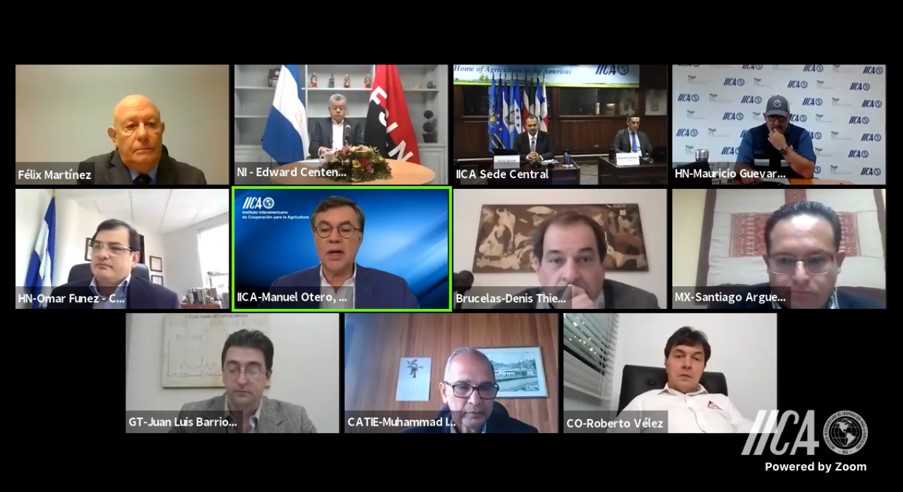Mesoamerican Coffee Forum highlights innovation opportunities and growth challenges for the coffee sector

San Jose, 4 December 2020 (IICA). The Mesoamerican Coffee Forum highlighted the importance of strengthening the institutional framework, strategic partnerships and innovation to meet the challenges facing the coffee chain in the region.
The issues that affect the coffee chain were analyzed during a meeting entitled “Innovation Opportunities for Mesoamerican and Caribbean Coffee Production”, organized within the framework of the Central American Program for Integrated Coffee Rust Management (PROCAGICA), funded by the European Union (EU) and implemented by the Inter-American Institute for Cooperation on Agriculture (IICA).
Among the participants were Denis Thieulin, Deputy Head of Unit for Regional Operations for Latin America and the Caribbean of the European Commission’s Directorate General for International Cooperation and Development; Edward Centeno, Minister of Agriculture of Nicaragua and Pro-Tempore Chair of the Central American Agricultural Council (CAC); Mauricio Guevara, Secretary of Agriculture and Livestock of Honduras; and Santiago Argüello, Director General of Agricultural Development at the Secretariat of Agriculture and Rural Development (SADER) of Mexico.
Also in attendance were Manuel Otero, Director General of IICA; Muhammad Ibrahim, Director General of the Tropical Agricultural Research and Higher Education Center (CATIE); and experts and leaders of coffee organizations in Colombia, Brazil, Mexico, Central America, Panama and the Dominican Republic.
According to Mauricio Guevara, one of the challenges facing the region’s coffee farming sector is reducing the gap between international coffee prices and producers’ income.
“It just can’t be that our producers receive a pittance compared to the sales price of a product to which they dedicate so much time and hope”, stated the Secretary of Agriculture of Honduras.
Nicaraguan Minister Edward Centeno noted that the coffee sector in Mesoamerica, and particularly in his country, requires support to recover from the impact of hurricanes Eta and Iota. He also called for expanding support programs for small-scale producers, such as PROCAGICA. “Now is the time to join forces in order to move forward together”, he stressed.
Santiago Argüello, of Mexico’s SADER, expressed similar views. “These forums provide us with knowledge and experiences to improve the positioning of Mesoamerican coffee and continue developing concrete actions to strengthen the sector”, he stated.
“The best response to these risks is a stronger institutional framework, with the capacity to manage policies, programs and plans that can improve the chain’s competitiveness and strengthen public-private relationships. Strong coffee institutions allow for boosting the sector’s resilience”, remarked the Director General of IICA during the virtual event.
Muhammad Ibrahim underscored the importance of innovation for the sector. “We have been working with donors to develop new coffee hybrids that are highly resistant to coffee leaf rust, the main disease at the moment; in fact, many of them are already being grown on evaluation and scale-up plots together with PROCAGICA”, he explained.
Boosting reactivation
Denis Thieulin, of the European Commission’s Directorate General for International Cooperation and Development, highlighted the fact that the EU supports post-Covid-19 reactivation processes in Central America.
“We firmly believe that the coffee sector has the potential to drive sustainable development and generate employment. PROCAGICA has made important achievements with respect to risk management in coffee farming, and has supported small-scale producers in better overcoming adverse conditions, such as those related to climate change”, he stated.
Carlos Armando Uribe, Vice-President of the National Federation of Coffee Growers of Colombia, one of the largest coffee farming organizations in the world, highlighted the role played by institutions in boosting the competitiveness of coffee farming, as well as the need for institutions to prioritize the well-being of producers and their families, before thinking about the plant and crop.
The virtual event ended with the presentation of a study by specialist Vera Espíndola-Rafael, a member of the Board of Directors of the Specialty Coffee Association (SCA), on the status of the global and regional coffee market, prospects for change and opportunities for Mesoamerican and Caribbean producers.
Overall, the study calls for greater transparency and uniformity in the management of coffee data from countries in the region.
The Mesoamerican Coffee Forum gives continuity to the agreement signed in September 2019 between the Government of Mexico, through the Secretary of SADER, Víctor Villalobos, and the ministers of CAC, which is aimed at improving the positioning of Mesoamerican and Caribbean coffee and generating specific actions that can contribute to boosting the competitiveness, profitability, sustainability and social welfare of the coffee sector.
More information:
Institutional Communication Division at IICA.
comunicacion.institucional@iica.int